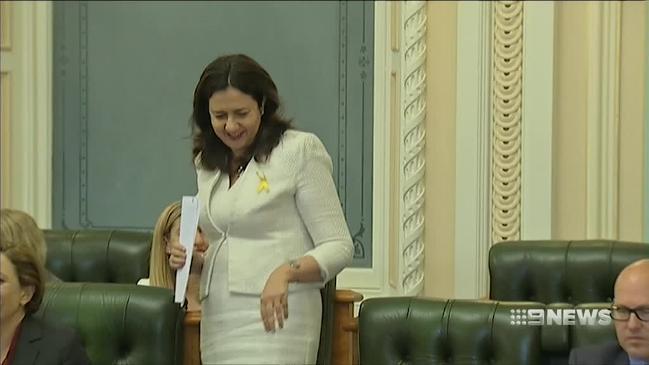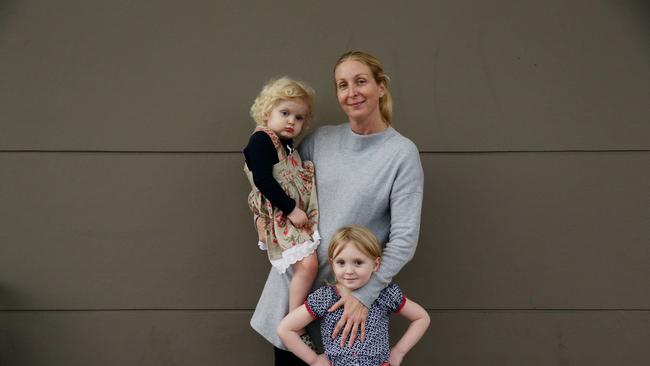ACCC accuses electricity companies of deliberately hurting families
POWER companies have been accused of confusing customers and finding loopholes to charge more, sparking the consumer watchdog to consider extraordinary laws.

QLD News
Don't miss out on the headlines from QLD News. Followed categories will be added to My News.
POWER companies are accused of deliberately confusing customers and finding loopholes to charge more, sparking the consumer watchdog to consider extraordinary laws so households are no longer worse off.
In a shocking blowtorch to be released today, the Australian Competition and Consumer Commission has laid bare the cost of high power prices — families going without food, medical help and school needs.
The ACCC has found the national electricity market has created “serious affordability” problems that are hurting households and businesses.
And in findings likely to be seized on by state Opposition Leader Tim Nicholls, ACCC chairman Rod Sims has estimated Queenslanders paid the most to turn on their lights in 2016-17.
The average southeast Queensland power bill has skyrocketed 52 per cent in just nine years.
In 2007-08, the average bill was $1287, but the estimated bill Queenslanders paid last year was almost $2000.
Over-investment in poles and wires, the cost of making electricity and union-negotiated pay rises were in part to blame. Environmental schemes have also caused “a significant component of the increase in overall customer bills”.
“The ACCC estimates that in 2016-17, Queenslanders will be paying the most for their electricity, followed by South Australians and people living in NSW,” Mr Sims said yesterday.
Treasurer Scott Morrison will seize on the report today to vindicate measures taken by the Government — such as calling in big power companies to demand a better deal for consumers — and lay the groundwork for its energy policy.
“The ACCC also noted that complexity in the market is making it difficult for Australians to shop around for better deals and compare electricity pricing offers,” Mr Morrison told The Courier-Mail.
“The report made a number of recommendations the Government will now consider, including that the costs of any future environmental schemes needed to be in proportion to the benefit they were trying to achieve.”
Mr Sims is now considering recommending to Government in his final report next year new enforceable principles based on the UK’s independent national regulatory authority’s Office of Gas and Electricity Markets (Ofgem).
His 175-page report said Ofgem would shift its “focus of the fairness test to consideration of whether a retailer’s conduct will give rise to a likelihood of detriment to a customer, unless the detriment would be reasonable in all the relevant circumstances.
“Ofgem describes these changes as requiring retailers to ‘put consumers at the heart of their business and treat them fairly’.
“The ACCC will consider the implementation of the Standards in the United Kingdom throughout the remainder of the Inquiry closely in forming its recommendations on potential amendments to the National Energy Retail Law.”

Mr Sims said power giants — such as AGL, Origin and EnergyAustralia — were making it difficult for smaller retailers to compete.
“Consumers and businesses are faced with a multitude of complex offers that cannot be compared easily.
“There is little awareness of the tools available to help consumers make informed choices or seek assistance if they are struggling to pay their electricity bills.
“Many of these issues arise from unnecessarily complex and confusing behaviour by electricity retailers, and in some cases this appears to be designed to circumvent existing regulation.”
The report said submissions received outlined the hardship many households were facing.
“For low income or vulnerable households, meeting increases in electricity costs can mean reducing expenditure on other basics like food, children’s educational needs or healthcare, or deferring household repairs or basic transport costs.
“The proportion of household disposable income spent on electricity was around five times greater for the lowest income quintile as it was for the highest income quintile
“According to market research, 20 per cent of residential customers are considered at high risk of experiencing some difficulty in meeting their energy costs.”
Queensland Energy Minister Mark Bailey said the ACCC report showed the national electricity market was broken.
He said retaining power assets in public ownership helped reduce the price increase compared to other states.
“This year we are seeing a three per cent increase in Queensland because we’re using our publicly owned power companies to drive better outcomes for consumers,” Mr Bailey said.
“What we need in this broken national electricity market is the Turnbull Government to stop their arguing with Tony Abbott and come up with a strong energy policy on the clean energy target.
Mr Bailey said the Queensland Government’s 50 per cent renewable energy target would drive down costs.
“What we know is that renewables are getting cheaper and cheaper every year,” he said.
“They are now the cheapest form of energy infrastructure by a long way.
“If we want the best outcomes for bills you’ve gotta back the cheapest, latest technology in our system.”
Mr Bailey denied state generators were gaming the system to rip off consumers but said the national electricity market needed reform.
“This is just another attack on public ownership of our energy assets,” he said.
‘WE’RE LOOKING INTO SOLAR’

NICOLE Jones, who lives in Bardon with her partner and two young daughters Mika and Arkie, said electricity prices had a significant impact on her family’s cost of living.
“It’s one of the bigger bills that we have to pay,” she said.
“We’re looking into solar because of it.”
Ms Jones said the cost of her family’s power bill was roughly between $600 and $700 per quarter.
“I don’t really know the details — whether we’re being ripped off — but it’s an expensive bill,” she said.
‘IT’S GETTING MORE DIFFICULT’

ATLAS Harwood, who co-owns James St fashion boutique Gail Sorronda, said his store’s electricity bill had spiked significantly in the past year.
The 36-year-old said his monthly bill was about $300 for the quaint store, which has only two lamps, air conditioning and a number of spotlights.
“There has been a consistent increase over the past five years since we’ve had this shop,” he said.
“It’s definitely been more noticeable in the last 12 months.
“That price alone is manageable for now, but combined with increases in rent and general expenses, it’s getting more difficult, especially if they continue to increase.”


